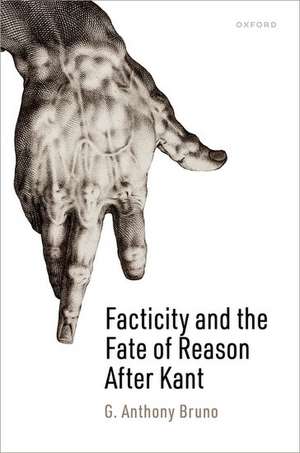Facticity and the Fate of Reason After Kant
Autor G. Anthony Brunoen Limba Engleză Hardback – 12 mar 2025
Preț: 531.77 lei
Preț vechi: 758.89 lei
-30% Nou
Puncte Express: 798
Preț estimativ în valută:
101.76€ • 108.81$ • 84.84£
101.76€ • 108.81$ • 84.84£
Carte nepublicată încă
Doresc să fiu notificat când acest titlu va fi disponibil:
Se trimite...
Preluare comenzi: 021 569.72.76
Specificații
ISBN-13: 9780198875673
ISBN-10: 0198875673
Pagini: 352
Dimensiuni: 156 x 234 mm
Editura: OUP OXFORD
Colecția OUP Oxford
Locul publicării:Oxford, United Kingdom
ISBN-10: 0198875673
Pagini: 352
Dimensiuni: 156 x 234 mm
Editura: OUP OXFORD
Colecția OUP Oxford
Locul publicării:Oxford, United Kingdom
Recenzii
G. Anthony Bruno's study breaks new ground in showing how the quest for a 'presuppositionless' science of knowledge shaped the main contours of post-Kantian thought into the early twentieth century. The book is a tour de force investigation of the lasting legacy of German Idealism, one that offers original insight into its historical context and enduring philosophical value.
Bruno has elegantly demonstrated that debates about the nature of reason from Kant and German Idealism (including Fichte, Schelling, and Hegel) to Heidegger (via Husserl, Dilthey, and Lask) turn inter alia on the problem of 'facticity' (the problem of whether reason can be completely self-justifying or rather rests on irreducibly non-rational grounds, such as the contingent ontological constitution of the human being). The scholarship is superior, the interpretations provocative, and the prose eminently readable. Facticity and the Fate of Reason After Kant provides an original historical genealogy seamlessly connecting German idealism to phenomenology by reference to a fundamental philosophical problem. Historians and philosophers interested in modern philosophy in and after Kant stand to learn a great deal from Bruno's carefully crafted monograph.
Bruno's book sheds new light on the history of post-Kantian thought from Fichte to Heidegger by turning to the under-appreciated problem of facticity: can a philosophical account of the necessary conditions of intelligibility avoid the problem of brute facts? Through the lens of this question, Bruno stages a series of illuminating confrontations between the key figures of German idealism and phenomenology, making a strong case that the fault lines of post-Kantian thought revolve around facticity as a central problem.
One of Kant's most challenging innovations is the idea that some features of humanity are at once both internal to human reasoning and also groundless. Here lies a parting of the ways. On one hand, Hegel, uncomfortable with the very idea of groundlessness as internal to human reasoning, seeks a stronger conception of human reason, trusting in itself alone, and sufficient for its own explication. On the other hand, Schelling and Heidegger embrace the radical bruteness of forms of intelligibility, which philosophy cannot deduce but must interpret. Thus the question raised by Bruno, still vital today, ultimately concerns the very nature of philosophy: should it aspire to the self-sufficiency of the science of reason, or interpret the radically contingent conditions of human life? This brilliant book presents these options in a lucid and compelling manner.
Bruno has elegantly demonstrated that debates about the nature of reason from Kant and German Idealism (including Fichte, Schelling, and Hegel) to Heidegger (via Husserl, Dilthey, and Lask) turn inter alia on the problem of 'facticity' (the problem of whether reason can be completely self-justifying or rather rests on irreducibly non-rational grounds, such as the contingent ontological constitution of the human being). The scholarship is superior, the interpretations provocative, and the prose eminently readable. Facticity and the Fate of Reason After Kant provides an original historical genealogy seamlessly connecting German idealism to phenomenology by reference to a fundamental philosophical problem. Historians and philosophers interested in modern philosophy in and after Kant stand to learn a great deal from Bruno's carefully crafted monograph.
Bruno's book sheds new light on the history of post-Kantian thought from Fichte to Heidegger by turning to the under-appreciated problem of facticity: can a philosophical account of the necessary conditions of intelligibility avoid the problem of brute facts? Through the lens of this question, Bruno stages a series of illuminating confrontations between the key figures of German idealism and phenomenology, making a strong case that the fault lines of post-Kantian thought revolve around facticity as a central problem.
One of Kant's most challenging innovations is the idea that some features of humanity are at once both internal to human reasoning and also groundless. Here lies a parting of the ways. On one hand, Hegel, uncomfortable with the very idea of groundlessness as internal to human reasoning, seeks a stronger conception of human reason, trusting in itself alone, and sufficient for its own explication. On the other hand, Schelling and Heidegger embrace the radical bruteness of forms of intelligibility, which philosophy cannot deduce but must interpret. Thus the question raised by Bruno, still vital today, ultimately concerns the very nature of philosophy: should it aspire to the self-sufficiency of the science of reason, or interpret the radically contingent conditions of human life? This brilliant book presents these options in a lucid and compelling manner.
Notă biografică
G. Anthony Bruno is Assistant Professor of Philosophy at Royal Holloway University of London and Co-Director of the London Post-Kantian Seminar. Recently, he was an Alexander von Humboldt Alumni Fellow at the Humboldt University of Berlin, an Alexander von Humboldt Alumni Fellow at the University of Tübingen, and an Experienced Research Fellow at the Forschungskolleg Analytic German Idealism at the University of Leipzig. He is the editor of Schelling's Philosophical Investigations into the Essence of Human Freedom: A Critical Guide (forthcoming), co-editor of Transformation and the History of Philosophy, editor of Schelling's Philosophy: Freedom, Nature, and Systematicity, and co-editor of Skepticism: Historical and Contemporary Inquiries.
